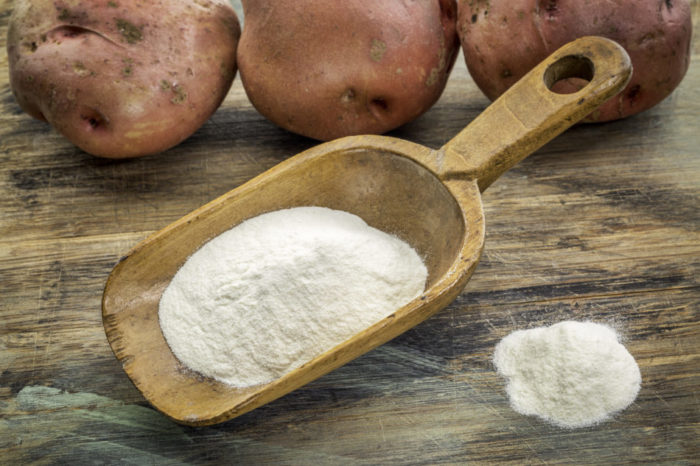
Potato flour is an excellent thickener that can work with a wide variety of recipes. From soups to baking, this flour has you covered. With a versatile ingredient like this available, some recipes can get quite lively. But, what can you do if there’s no potato flour at hand? Now would be a time to try some potato flour substitutes.
Since the flour works best as a thickener, a lot of options are going to involve starch. However, that’s not the only option to work with. A few other products and flours can work just as well.
So, let’s see what the top substitutes for potato flour are.
Top Substitutes For Potato Flour
1. Potato Flakes
Potato flakes are the natural substitute for potato flour. Generally speaking, these are both pretty much the same thing. The larger difference is that flakes are coarse while the flour is finely ground.
As such, it’s possible to use potato flakes with any recipe that calls for potato flour. While adding flakes “as is” will work just fine, you might want to crush them into a fine powder before use. This bridges the gap between texture of the flakes and flour. Remember not to use pre-seasoned potato flakes as they’ll have a negative effect on the recipe.
2. Potato Starch
Potato flour is roughly 83% starch. So, no surprise that potato starch works wonderfully well as a substitute. While some might suggest changing quantities to account for the 83% and remaining 17%, it’s really not necessary. In most situations, that difference is minor enough to be ignored.
The part to keep in mind is the composition and taste of these elements. Potato starch is just plain, tasteless starch. On the other hand, potato flakes contain some nutrients and flavor. Baked goods like bread are going to make that difference clear, though it isn’t as troublesome.
3. Cornstarch
Cornstarch is widely available and perhaps the easiest substitute to use for potato flakes. It’s one of the most widely used thickeners and is gluten-free. Cornstarch is good to go with almost all food, so it’s a quick and easy solution. Keep in mind, as a starch this offers no nutritional or even taste benefits unlike potato flour, which does offer some taste and nutrient benefits.
4. Mashed Potatoes
Here’s another quick and easy choice to substitute potato flour. The biggest difference between mashed potatoes and potato flour is the water content. While flour is more towards being dehydrated, the mashed potatoes have a lot of water content.
As such, when used with a recipe, the mashed potatoes won’t absorb much water. So, you’ll have to change the water content requirements for a recipe. If you can work around the extra moisture, the finished recipe won’t see any difference whether you use mashed potatoes or potato flour.
5. All-Purpose Flour
Here’s one of the situations where all-purpose flour comes true to its name! If you’re in a pinch, replace potato flour with an equal amount of all-purpose flour. The all-purpose flour can carry most recipes on its own merit.
This is not a simple and straight substitution. Potato flour absorbs a lot of water, significantly more than all-purpose flour. When choosing this alternative, be prepared to adjust the water quantity (moisture) for a recipe. Also, there will be changes in flavor as the subtle potato flavor gets replaced with all-purpose flour.
6. Arrowroot Flour
Arrowroot flour is actually a starch, which is why it’s also known as arrowroot starch. It’s an excellent thickener and finds use in many recipes. As a starch, it doesn’t add to the taste of a recipe. Though it adds a nice glossy shine to the food. It’s especially wonderful when used for baking.
7. Quinoa Flour
Quinoa is one of the most celebrated health foods of our time. And it might be a good idea to consider switching potato flour with this healthier alternative. While quinoa flour isn’t the best thickener, it can work with many recipes without a hitch. But do expect a change of flavor.
It’s a good pick for shakes and smoothies, and goes great with soups and stews as well.
8. Rice Flour
It’s possible to use rice flour in some recipes to replace potato flour. This isn’t the best substitute as there is a clear change in taste and flavor. The flour is useful for some soups and stews, though it can also work with breads, cakes, and biscuits.
9. Tapioca Flour
Tapioca flour, also known as tapioca starch, is a great alternative for potato flour. It works as a thickener and binder, and can replace potato flour in almost any recipe. Tapioca flour does bring along its own flavor, though it’s not overpowering or disturbing.
For most recipes, you can replace potato flour with equal amounts of tapioca flour.
10. Coconut Flour
Coconut flour is a very interesting option, though it’s not as widely available. One of the more interesting things here is how coconut flour compares to potato flour. For most substitutions, it’s important to adjust the water quantity because potato flour absorbs a lot of water.
It’s the same with coconut flour, though in the opposite direction. Coconut flour absorbs more moisture than potato flour, so you’ll have to add more water. It also brings a mild touch of coconut flavor, which is often a welcome addition for many recipes. Coconut flour is an excellent thickener and binding agent, so it works with most recipes and baked goods.
FAQs About Potato Flour Substitutions And More
Can I Substitute Almond Flour For Potato Starch?
Almond flour is an acceptable, though not an ideal substitute for potato starch. It does, however, work pretty well for baked goods like cakes and cookies. Besides, the touch of almond flavor that comes along with the flour could be more agreeable than just potato starch.
Is Potato Flour Healthier Than Flour?
Potato flour is generally considered healthier than conventional wheat flour as well as all-purpose flour. You’ll find more nutrients in potato flour as compared to processed wheat flour. Some of these nutrients are potassium, calcium, dietary fiber, niacin, and Vitamin C.
Additionally, potato flour is naturally gluten-free, while wheat flour contains gluten. It is also a more efficient thickener than wheat flour and works well with many recipes.
Is Potato Starch And Potato Flour The Same?
Potato flour contains a lot of starch, but it isn’t the same as potato starch. There is a whole lot of confusion about the differences as both of these products follow a similar manufacturing pattern. Sometimes, sellers and manufacturers get the difference wrong as well, which further compounds the problem.
To put their differences simply, potato flour is made from potatoes that have been cooked, dehydrated, and ground to a fine powder. The starch is generally extracted from washed and peeled raw potatoes. In some cases, the water from cooking potatoes may be used to get starch.
Is Potato Flour Gluten Free?
Potato flour is naturally gluten-free. It is made directly from potatoes and sometimes involves removing the fibrous material in the potatoes. As such, potato flour is an excellent alternative to gluten-containing flours. It helps that the flour absorbs a lot of water and can handle heat. All of these make it a great pick as a thickener, for baking, and for deep frying too.
Can I Use Potato Flakes Instead Of Potato Flour?
Potato flakes and potato flour are pretty much the same thing. The biggest difference between these two is the texture. Potato flour is finely ground and has a very fine texture. On the other hand, potato flakes have larger particles and are rougher.
Given that these two are largely the same, you can use potato flakes in place of potato flour. If you’d like to match the texture further, grind or crush the potato flakes into finer particles and they’ll be a decent match for the flour.
Getting The Right Substitute Fix
Potato flour is an impressive ingredient that greatly affects recipes and brings nice changes. It’s a remarkable thickener and binding agent, which sometimes adds a subtle taste and flavor to many recipes.
Should you need potato flour substitutes, start by looking at potato products like mashed potatoes and potato flakes. There are plenty of options available if you want to mix things up, and we’ve covered them all in this article.
